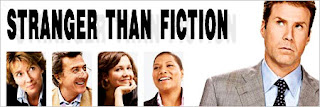Friday, November 11, 2011
Stranger Than Fiction: A Thought About The Film
I think it's a beautiful thing to engage in something, anything, with such passion that you lose yourself as you hone your skills to reach a goal, perfection or an ending.
This is the same in any media chosen to express whatever your passion is. I love reading books or stories that introduce characters so likable that you feel the pain of their loses or the enjoy of their accomplishments. The same goes for movies and the film Stranger Than Fiction is no exception to that rule.
I loved Will Ferrell's portrayal of the lonely, fated protagonist Harold Crick. Here is a character who is plain and hapless in his monotonous life that we see a reason to follow his story. The fact that Emma Thompson's character Karen Eiffel narratives his daily activities further provides a more in-depth understanding of Harold's narrative archetype that we, as the audience, find more compassion. Even Thompson's role as the eccentric writer and narrator are so rational, for writer's at the very least, and I personally find a weird connection with her character. Being a fiction writer has allowed me to really comprehend and also sympathize with the plight of creation and responsibility of fulfillment.
What do I mean by responsibility of fulfillment? It is the act of creating and the art of skillfully providing a reason for existence. Even if your character is to die, such is the case with Harold Crick, the writer still has to provide meaning and justification for the characters death. Writing endings are not easy by no means, let me tell you. So many aspects of narration, character development and story must be taken into account when you slowly reach those final pages and bring your written masterpiece to a close. I always find it difficult to end a story after I have provided such a fond and in-depth look at something that I poured my heart and soul into.
I feel such a great deal of responsibility in capturing and expressing a story with profound visualization and emotion that not only speaks to me but also hits a definite chord with readers of all kinds. The film Stranger Than Fiction does this on many levels. Mind you that what you're watching is a literary tale told visually and every aspect of plot, narration and arch are presented. At times I felt as though this could have actually been a graphic novel, a manga maybe, because it is literally a developing story that is in motion.
I liked the contrasts that progressively appear and further change and enhance the characters lives. Harold and Karen's lives are some what identical in the sense that they work in systematic fashion to approach situations. Harold operates in a corporate and mathematical/computational environment while Karen provides us with the common, at times unorthodox, method of story creation. When Maggie Gyllenhall's character Ana Pascal enters Harold's life it implements a vast contradiction to the life and organization that has ruled Harold's life. She is his opposite and Ana compliments, or in this case unbalances, his perspectives very nicely.
Another aspect of interest is the character of Prof. Jules Hilbert, played by Dustin Hoffman. I always look at this Hilbert as the mage or all knowing guide that helps Harold through his dilemma. He is instrumental in grounding the protagonist in a reasonable reality where Harold can attempt to find answers to his plight. Hoffman is just a lot fun as Hilbert; the kind of literary specialist I wish I had in school, ha!
I think the one moment that has stuck with me about this film is Harold and Karen's meeting. It is the moment where Karen as an author not only realizes that one of her fictionalized creations turned out to be real, but also her responsibility of giving him a meaningful and justified existence appears. On top of that, she also went further to provide a rational excuse to change. It is something that all us writers go through when we create. We always change where it is necessary while keeping in mind how it will effect the choices that we have made up to that point.
Even in writing, it is all about making choices and decisions and being responsible in making sure we fulfill those intentions.
Subscribe to:
Post Comments (Atom)

No comments:
Post a Comment